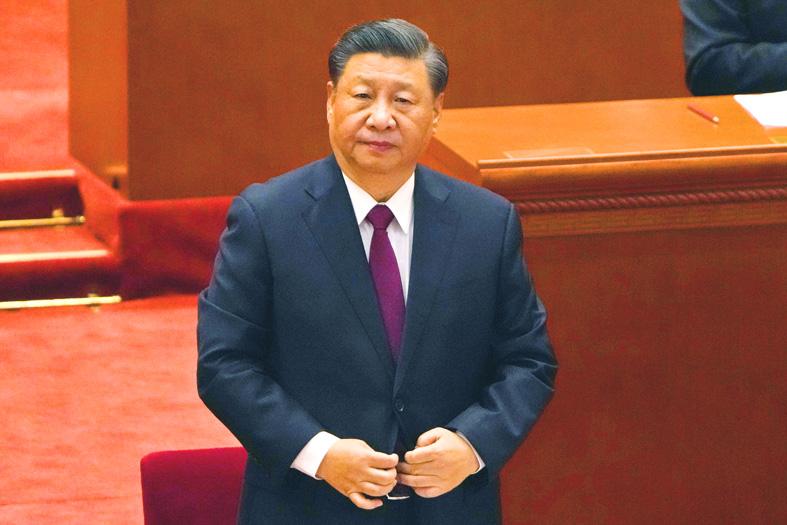A Chinese invasion of Kinmen County or another outlying island is “very possible” as Chinese President Xi Jinping (習近平) looks to divert attention from domestic troubles and fulfill his perceived historical duty, although such a move is unlikely to result in international sanctions if Taiwan proper remains untouched, an official familiar with cross-strait affairs said.
After Xi extends his term as expected later this year, he might face compounding economic and other problems, leading to growing domestic dissatisfaction with his performance, the official said on condition of anonymity.
Xi would likely respond by tightening crackdowns on dissent and shifting the focus to “historical duties,” they said.

Photo: AP
As the Hong Kong issue has already been resolved, the next target would be unifying Taiwan as a way to distract from domestic troubles, they added.
Since taking Taiwan proper would be difficult, smaller outposts would be far more probable targets, such as Kinmen, Matsu, the Pratas Islands (Dongsha Islands, 東沙群島) or Itu Aba Island (Taiping Island, 太平島), the official said.
China might also take a cue from Russia’s recognition of separatist areas in Ukraine as a pretext for its invasion, and claim that it is seeking to “rejoin” “pro-China” areas with the motherland, they said.
Direct annexation is also possible, considering China’s military estimates that it could take Kinmen in one day, they added.
Public sentiment in Kinmen is generally divided between the two sides, with residents happy about the economic opportunities afforded by China, as well as the political freedom, social equality and healthcare provided by Taiwan, they said.
However, the official voiced concern that Taiwan would be unable to defend the county if China were to invade, while foreign troops would be unwilling to fight for it.
The most likely scenario would be for China to target Kinmen or Matsu, as it would be less likely to trigger international sanctions as compared with attacking Taiwan proper, the official said.
The fighting would be left to Taiwan’s military and the will of the residents, many of whom would likely surrender, they added, citing surveys showing that Kinmen residents are less likely to view China as an enemy than the rest of Taiwanese, while its politicians are typically reluctant to anger Beijing.
Chinese attempts to fold Kinmen into its economic plan for the Fujian region would have an effect on the county, if nothing else reducing its willingness to fight, the official said.
They also called for legal procedures to follow in the event of military conflict, as cross-strait regulations only cover what to do during peacetime, despite the rising threat of war under Xi’s leadership.

Alain Robert, known as the "French Spider-Man," praised Alex Honnold as exceptionally well-prepared after the US climber completed a free solo ascent of Taipei 101 yesterday. Robert said Honnold's ascent of the 508m-tall skyscraper in just more than one-and-a-half hours without using safety ropes or equipment was a remarkable achievement. "This is my life," he said in an interview conducted in French, adding that he liked the feeling of being "on the edge of danger." The 63-year-old Frenchman climbed Taipei 101 using ropes in December 2004, taking about four hours to reach the top. On a one-to-10 scale of difficulty, Robert said Taipei 101

Nipah virus infection is to be officially listed as a category 5 notifiable infectious disease in Taiwan in March, while clinical treatment guidelines are being formulated, the Centers for Disease Control (CDC) said yesterday. With Nipah infections being reported in other countries and considering its relatively high fatality rate, the centers on Jan. 16 announced that it would be listed as a notifiable infectious disease to bolster the nation’s systematic early warning system and increase public awareness, the CDC said. Bangladesh reported four fatal cases last year in separate districts, with three linked to raw date palm sap consumption, CDC Epidemic Intelligence

US climber Alex Honnold left Taiwan this morning a day after completing a free-solo ascent of Taipei 101, a feat that drew cheers from onlookers and gained widespread international attention. Honnold yesterday scaled the 101-story skyscraper without a rope or safety harness. The climb — the highest urban free-solo ascent ever attempted — took just more than 90 minutes and was streamed live on Netflix. It was covered by major international news outlets including CNN, the New York Times, the Guardian and the Wall Street Journal. As Honnold prepared to leave Taiwan today, he attracted a crowd when he and his wife, Sanni,

Taiwanese and US defense groups are collaborating to introduce deployable, semi-autonomous manufacturing systems for drones and components in a boost to the nation’s supply chain resilience. Taiwan’s G-Tech Optroelectronics Corp subsidiary GTOC and the US’ Aerkomm Inc on Friday announced an agreement with fellow US-based Firestorm Lab to adopt the latter’s xCell, a technology featuring 3D printers fitted in 6.1m container units. The systems enable aerial platforms and parts to be produced in high volumes from dispersed nodes capable of rapid redeployment, to minimize the risk of enemy strikes and to meet field requirements, they said. Firestorm chief technology officer Ian Muceus said